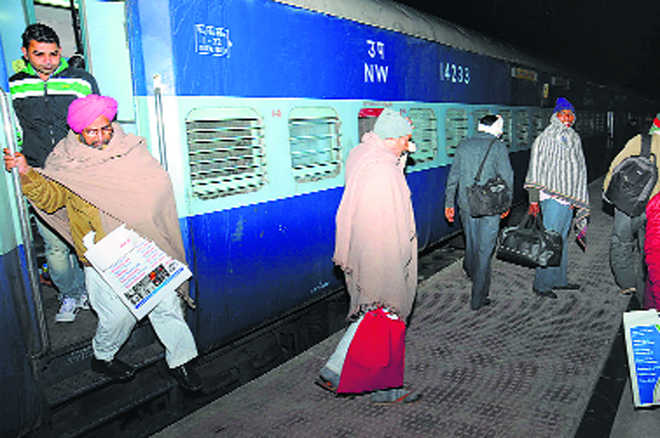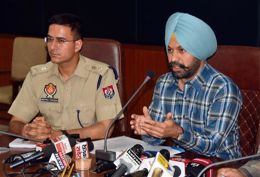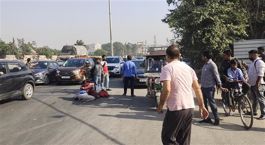
Deadly journey: The novel is about the notorious train from Bathinda to Bikaner cancer hospital. Due to excessive use of pesticides and other chemicals, the Malwa region of Punjab, particularly the cotton belt, has seen an alarming number of cancer cases
Jaspal Singh
The agrarian sector of Punjab has undergone a radical change in the last half century since the advent of green revolution in the state. It made the country self-sufficient in food grains but at a humongous human cost that is taking its toll now. Medical experts, economists, agriculture scientists and social activists have raised their voice against this catastrophe which has been emphatically reported in the media. But the literary community, supposed to be more sensitive to such issues, has not yet responded with equal concern.
Punjabi litterateurs have remained busy in socio-cultural and kinship rigmarole spawning poem after poem, story after story and novel after novel, and some of them repeatedly chewing the same cud in different jargon. However, recently a few writers have written about the problem of rural distress in Punjab. Nachhatar is a retired banker from Barnala who is settled in Delhi. He has made this problem the subject matter of his latest novel Cancer Train. He has already published around six collections of short stories and an equal number of novels besides miscellaneous writing. Last year Nachhatar won National Sahitya Akademi Award for his novel Slow-down that was based on the global financial disaster of 2008 and its fallout in India.
Cancer Train is about the notorious train from Bathinda to Bikaner cancer hospital. The Malwa region of Punjab, particularly the cotton belt, is facing an acute ecological disaster as a result of excessive use of harmful pesticides and other chemicals that have contaminated the soil, water and air. As a result, a huge number of people have been affected with maladies like cancer, liver dysfunction, mental retardation, stunted growth and many other ailments.
The novel begins with the death of a social activist Jarnail and then the narrative courses through flash-back. A young scientist, Aman is researching about the impact of degradation of soil, water and air in the Malwa region caused by over-chemicalisation of agriculture at PAU Ludhiana. During his research, he travels through hundreds of villages, where he encounters hundreds of cancer patients, who are in a pitiable condition. These ailing characters — Nirmal, Karmi, Banso or Master Randhir Singh — represent thousands real people who carry the burden of this mass tragedy in this horrific tale.
Aman maintains a diary and during his journey he meticulously records the facts. Jarnail, the good Samaritan, known all over the region for his social work, accompanies him everywhere. In the novel as in real life it is found that the occurrence of cancer in the region is more prevalent among small, marginal farmers and landless labourers. This could possibly be due to the fact that these people are more exposed to the poisonous chemicals used in cultivation since they actually handle these in fields. The rich farmers can easily afford to hire labour and thus avoid the wrath of these maladies. They escape from water contamination also as they have water purifiers at homes When poor farmers and labourers contract the disease they become totally helpless. Whatever little money they have is lost in getting the treatment and they have to further borrow from commission agents at an exorbitant rate of interest. Consequently, their lives become extremely pitiable.
Even government schemes like MGNREGA fail to help these poor victims since many times the money does not reach them because of corrupt officials or even panchayat members. The public health system in Punjab has collapsed and the ruling class has a vested interest in its destruction since most of the private health facilities and hospitals are patronised by them. The author believes that the ruling cabal is working with a design to keep the people ill-educated and hooked to drugs so that they do not ask for jobs. This is a different matter that these problems have ruined thousands of families in the state.
Cancer Train touches almost every malady afflicting rural Punjab and it seems that the solution to this crisis is beyond the power of the present dispensation. One of the main characters of the novel Jarnail wages a war against cancer in his own way but in the end, he, too, falls a victim to it. Aman, the protagonist, who becomes a medium of conducting an extensive survey to highlight all noxious problems, is ultimately left alone to morosely ponder over the fate of these doomed people. Nachhatar, a sensitive son of the soil, has been able to understand the plight of his people caught in a whirling vortex of time.



























